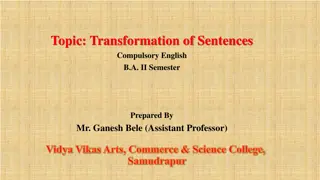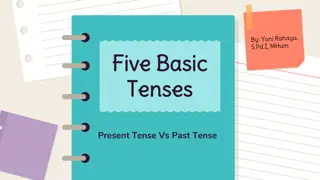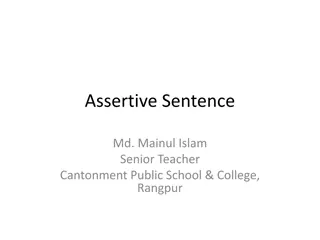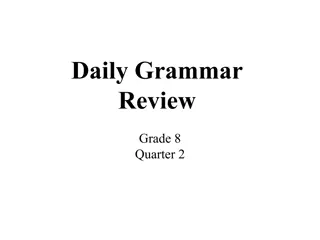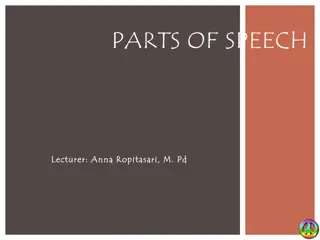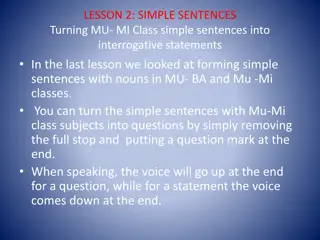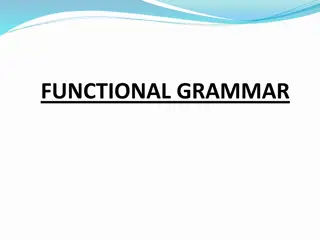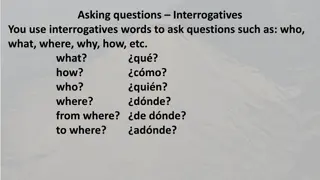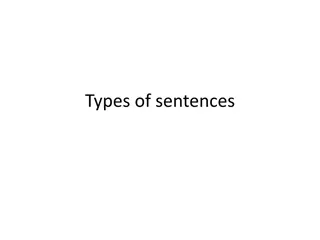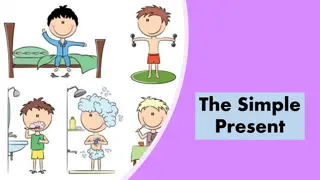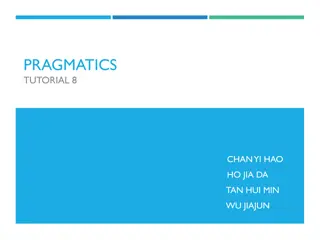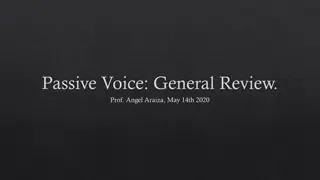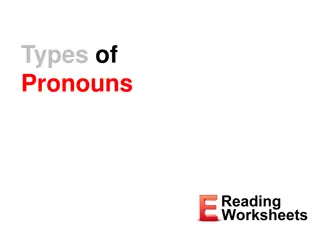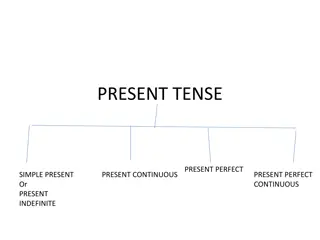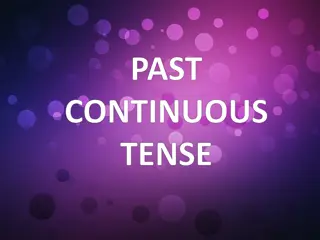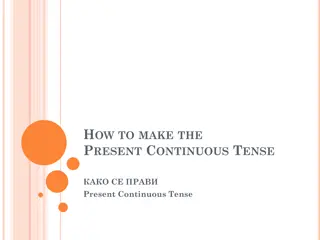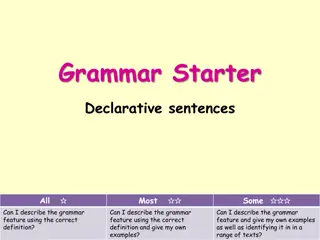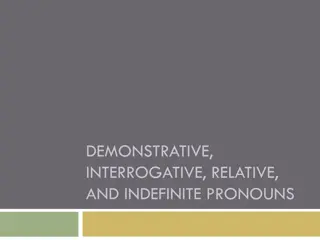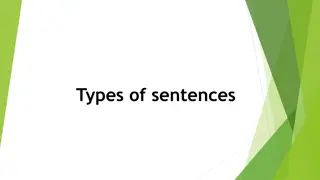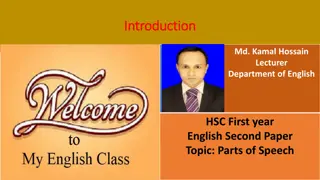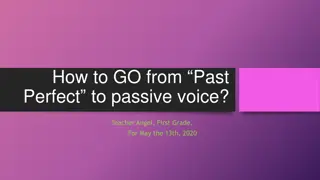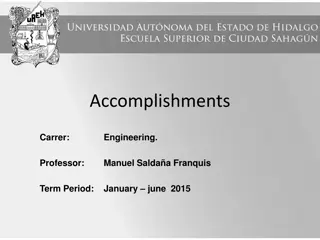Sentence Transformation Guidelines and Exercises for B.A. II Semester English
Understand the concept of sentence transformation to alter sentence forms without changing meanings. Learn various types of transformations like affirmative to negative, interrogative to assertive, and more. Practice exercises provided for hands-on learning.
2 views • 11 slides
Assertive to Interrogative: English Grammar Exercises and Practice
Enhance your English grammar skills with exercises on changing assertive sentences into interrogative ones. Learn how to transform sentences using auxiliary verbs, modal verbs, and without auxiliary verbs through practical examples and practice questions. Improve your sentence structure and comprehe
2 views • 24 slides
Present vs. Past Tenses in English Grammar
Exploring the basics of present and past tenses in English grammar, covering affirmative, negative, and interrogative structures, as well as adverbs of frequency and quantity. Learn about describing general facts, habitual actions, and specific past events through detailed examples and visual aids.
8 views • 13 slides
Sentence Types and Structure
Explore the types of sentences - Assertive, Interrogative, Declarative, Imperative, and Exclamative, each serving a unique purpose in communication. Learn about sentence patterns, word order, and examples for better comprehension.
4 views • 8 slides
English Transformation Rules: Assertive to Interrogative with Examples
Learn the rules of transforming assertive sentences into interrogative sentences in English grammar. Understand the different scenarios and examples for the transformation process. Enhance your skills in using interrogative sentences in various situations while maintaining the original meaning. Dive
2 views • 23 slides
Daily Grammar Review Challenges for Grade 8 Students
Engage in a week-by-week grammar review for 8th-grade students. The lessons consist of identifying declarative or interrogative sentences, punctuating sentences with periods or question marks, and distinguishing between exclamatory and imperative sentences. Enhance your grammar skills with daily exe
2 views • 61 slides
Enhancing English Writing Skills through Sentence Transformations
Practice sentence transformations in English to improve writing skills. Learn how to change sentence structures according to specific directions. Develop proficiency in forming complex, negative, passive, interrogative, and other types of sentences. Enhance comprehension and expression for S.S.C exa
3 views • 16 slides
Mood and Modality in Morphosyntax with Prof. John Corbett
Today's session with Prof. John Corbett explores the final three sets of grammatical categories related to verbs: mood (fact or non-fact), modality (speaker's stance), and voice (subject's role). The session delves into the present-day English mood system, differentiating between various realization
1 views • 24 slides
Parts of Speech: Nouns and Pronouns Overview
Dive into the world of nouns and pronouns with this detailed guide covering definitions, examples, and practice exercises on common nouns, proper nouns, and different types of pronouns such as personal, demonstrative, and interrogative pronouns.
1 views • 19 slides
Forming Interrogative Statements in Luganda with MU-MI Class Subjects
Learn how to turn simple sentences with MU-MI class subjects into interrogative statements in Luganda by replacing the full stop with a question mark. Understand the changes in prefixes when forming questions, such as 'g' to 'gy' and 'gu' to 'gwa'. Practice examples and grasp the rules for creating
0 views • 10 slides
Functional Grammar: Nouns, Pronouns, and Punctuation
Functional grammar involves understanding the parts of speech, such as nouns and pronouns, along with proper punctuation usage. Explore the different kinds of nouns like proper, common, collective, material, and abstract. Learn about the various types of pronouns including personal, reflexive, relat
0 views • 39 slides
Transformation of Sentences in English: Practice Questions and Answers
These practice questions and answers focus on transforming sentences in English. The exercises cover various sentence structures such as positive, negative, interrogative, complex, passive, superlative, and more. By changing sentences as directed, you can enhance your understanding of sentence trans
0 views • 7 slides
Different Types of Sentences
Learn about the four types of sentences - Assertive, Imperative, Interrogative, and Exclamatory. Understand their characteristics and see examples to identify each type correctly. Enhance your knowledge of sentence structure and punctuation rules.
0 views • 8 slides
Rules of Narration in English | Teacher Mohammad Harun
Explore the rules of narration in English, learn about changing speech from direct to indirect, and understand how to apply these rules through examples provided by senior teacher Mohammad Harun at Golam Bari Govt. High School. Get insights on assertive, interrogative, and imperative sentences in re
0 views • 19 slides
Spanish Interrogatives: Asking Questions and Sentence Structure
Interrogative words in Spanish are used to ask questions, such as who, what, where, why, and how. When forming questions, the verb is placed before the subject in Spanish. Additionally, the placement of interrogatives changes when asking for confirmation or denial. Learn more about asking how much a
0 views • 6 slides
Weather Transformations: Yesterday's Conditions and Present Tense Conversions
Explore different weather conditions from yesterday and convert sentences into negative, interrogative forms, and Simple Present tense. From cold and snowy days to hot and stormy nights, practice transforming sentences in different contexts.
0 views • 10 slides
The Four Types of Sentences
Declarative, imperative, interrogative, and exclamatory sentences each serve a unique purpose in communication. Declarative sentences state facts, imperatives give commands, interrogatives ask questions, and exclamatory sentences express strong emotions. By recognizing the characteristics of each ty
0 views • 18 slides
Health Education Unit Overview
This educational unit focuses on identifying and using different illnesses, practicing the interrogative form of present continuous tense, and enhancing listening, speaking, and writing abilities. Students will learn about various common illnesses and how to form interrogative sentences in the prese
0 views • 10 slides
Simple Present Tense: Usage, Formation, and Spelling Rules
Explore the Simple Present Tense through daily routines, affirmative statements, formation rules for different pronouns, spelling guidelines for adding final -s, and forming interrogative sentences. Understand how to express habits, truths, and routines in English using clear examples and explanatio
0 views • 12 slides
English 2nd Paper Class for HSC/Alim - Assertive, Interrogative, Exclamatory Sentences Practice
Join Sabina Yeasmin's English 2nd Paper class at Baridhara Nazmul Ulum Alim Madrasah, Dhaka for HSC/Alim students. Practice converting assertive to exclamatory and interrogative sentences. Explore examples like "Anger is nothing but a vice" transformed to "Is anger anything but a vice?" Learn how to
0 views • 11 slides
Speech Act Theory and Pragmatics Tutorial
Dive into the intricacies of speech act theory with a focus on direct and indirect speech acts, illocutionary and perlocutionary forces, and performative verbs. Explore various linguistic forms including interrogative and declarative structures to understand how language can be used to convey intent
0 views • 35 slides
The Present Perfect Tense for Describing Life Experiences
Explore the uses of the Present Perfect tense to discuss life experiences without specifying a date or time. Learn how to form positive, negative, and interrogative sentences, using examples like traveling abroad, riding a horse, and more. Discover how to express having had or never had certain expe
0 views • 11 slides
Passive Voice and Verbal Times
Passive voice focuses on the object of the sentence, with examples of converting sentences from active to passive voice in different verbal tenses. It explains the concept of subject giving an object in active voice and the reception of the object in passive voice. The importance of subject in a sen
0 views • 9 slides
Different Types of Pronouns
Learn about the seven types of pronouns - Personal, Possessive, Reflexive, Relative, Demonstrative, Indefinite, Interrogative. Personal pronouns replace nouns, possessive pronouns replace possessive nouns, reflexive pronouns refer back to the subject, relative pronouns introduce relative clauses, an
0 views • 16 slides
Simple Present Tense and Its Usages
Simple Present Tense is used for habits, routines, and permanent truths. This tense follows a specific structure for positive, negative, and interrogative sentences. Through examples and exercises, learn how to correctly use Simple Present Tense in everyday conversations.
0 views • 8 slides
Simple Present Tense with Examples and Formation
Simple Present Tense is used to talk about actions that happen regularly or are true in the present. This tense is used for statements of fact, daily habits, schedules, opinions, and more. The formation includes affirmative, interrogative, and negative sentences. Examples and usage scenarios help in
0 views • 14 slides
The Past Continuous Tense
The Past Continuous Tense is used to describe interrupted activities that continued for a period in the past or things happening continuously in the past. Learn how to form affirmative, interrogative, and negative sentences in this tense with examples and images.
0 views • 12 slides
The Present Continuous Tense
Explore how to form the Present Continuous Tense using the present simple of 'be.' Learn how to create affirmative, negative, and interrogative forms, including 'wh-' questions. Discover the spelling rules for verbs ending in 'e,' short one-syllable verbs, and those ending in 'ie.'
0 views • 17 slides
Examples of Declarative and Interrogative Sentences
Explore examples of declarative and interrogative sentences, understand their definitions, and learn to convert questions into statements. Dive into various texts to identify these sentence types and enhance your grammar skills.
0 views • 5 slides
Mastering Quranic Arabic: Surah Baqrah and Interrogative Particles
Dive into Surah Baqrah verses 14-15 as we explore their meanings, alongside a study of Interrogative Particles in Arabic grammar. Prepare to reflect on the deeper teachings during your next salah.
0 views • 65 slides
Mastering Transformation of Sentences in English Classroom
Explore the four essential steps to transform sentences - from assertive and interrogative to imperative and exclamatory. Learn about sentence types like simple, complex, and compound along with active and passive voices. Practice converting sentences through examples provided by Assistant Teacher J
0 views • 13 slides
Demonstrative, Interrogative, Relative, and Indefinite Pronouns
Demonstrative pronouns point out specific people, places, things, or ideas. They include "this," "that," "these," and "those." Interrogative pronouns introduce questions and include "what," "which," "who," "whom," and "whose." Understanding the usage of these pronouns is essential in forming clear a
0 views • 21 slides
The Four Types of Sentences
Learn about the four types of sentences: declarative, interrogative, imperative, and exclamatory. Understand the differences between sentences and fragments, and see examples of each type in practice. Discover how to identify and use these different types of sentences effectively.
1 views • 9 slides
Pronouns: Types and Usage in English Grammar
Delve into the world of pronouns with this comprehensive guide covering definitions, types, and examples of personal, demonstrative, interrogative, relative, indefinite, distributive, reflexive, emphatic, and reciprocal pronouns. Explore how pronouns function as essential parts of speech in English
0 views • 6 slides
Grammar Revision Exercises for 7th Grade English Test
Practice simple past and past continuous tenses with exercises combining sentences, answering questions, and transforming sentences. Learn to use "while" and "when" correctly in context. Test your skills with negative and interrogative forms of past continuous sentences. Check the answers to assess
0 views • 7 slides
Grammar on the Go! Unit 5 Lesson 7 Sentence Corrections & Clauses
This content focuses on sentence corrections in red, defining vocabulary words, and understanding different types of sentences such as compound, complex, simple, and compound/complex. It also covers identifying sentence types like declarative, imperative, interrogative, and exclamatory. Additionally
0 views • 9 slides
Definiteness in Central Kurdish Noun Phrases
The exploration of two DP layers within the Central Kurdish noun phrase reveals the application of functional elements to express definiteness. Examining the role of D-category and the morpheme -e sheds light on the markers of definiteness in CK, providing insights into prenominal demonstratives and
0 views • 20 slides
Transforming Sentences from Past Perfect to Passive Voice
Learn how to convert sentences from the Past Perfect tense to Passive Voice with clear examples and a step-by-step guide. Understand the formula and rules for changing active voice sentences to passive voice sentences in English grammar. Explore how singular and plural subjects affect the transforma
0 views • 9 slides
Pronouns: Types and Usage
Pronouns are vital elements in language that replace nouns to avoid repetition and make sentences concise. They include personal, possessive, reflexive, intensive, indefinite, demonstrative, relative, interrogative, and reciprocal pronouns. Personal pronouns serve as subjects (e.g., I, he, she) or o
0 views • 18 slides
Expressing Accomplishments in English: A Comprehensive Guide
Learn how to express accomplishments in English using the verb "have/has" and past participle verbs. This guide covers affirmative, negative, and interrogative forms, along with differentiating between "since" and "for" when indicating duration. Master the language nuances for talking about achievem
0 views • 14 slides
